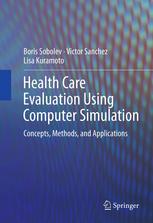

Most ebook files are in PDF format, so you can easily read them using various software such as Foxit Reader or directly on the Google Chrome browser.
Some ebook files are released by publishers in other formats such as .awz, .mobi, .epub, .fb2, etc. You may need to install specific software to read these formats on mobile/PC, such as Calibre.
Please read the tutorial at this link: https://ebookbell.com/faq
We offer FREE conversion to the popular formats you request; however, this may take some time. Therefore, right after payment, please email us, and we will try to provide the service as quickly as possible.
For some exceptional file formats or broken links (if any), please refrain from opening any disputes. Instead, email us first, and we will try to assist within a maximum of 6 hours.
EbookBell Team

0.0
0 reviewsThe purpose of this book is to place computer simulation studies within the paradigm of intervention research that is concerned with comparing the outcomes of health care delivered under different policies. This book presents computer simulation as a tool for testing various policy alternatives that have been developed by decision-makers within health care systems. This approach differs from the use of computer simulation in operations research, where simulation helps determine the configurations of a system that will allow it to function optimally. Although simulation of health care processes is not new, few health care systems have used simulations as a basis for re-engineering the delivery of health services. There is growing appreciation that the complexity of health care processes exceeds the capacity of individual disciplines–health services research, health economics, or operations research–to guide health care reform. In this book, the authors focus on bringing the methodological rigor of evaluative research to the design and analysis of such simulation studies. The book is intended as a reference for health services researchers. It offers a comprehensive description of the methodology of conducting simulation studies in evaluation of service alternatives in surgical care using discrete-event models, including the steps for identifying the clinical and managerial activities of the perioperative process, determining the model requirements, implementing simulation models, designing simulation experiments and analyzing the experimental data, and interpreting and reporting results. The book also offers examples of specific aspects of conducting simulation experiments: how to determine the number of runs needed to estimate the effect of implementing a health care policy; how to allocate the number of runs to study groups in simulation experiments aiming to evaluate policy or management alternatives; and how to use statistical analysis to estimate, interpret, and report effect sizes.